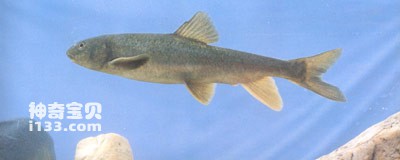Schizopygopsis malacanthus (Schizopygopsis malacanthus) belongs to the order Cypriniformes, family Cyprinidae, subfamily Schizothorax, and genus Schizopygopsis. Commonly known as: native fish, small mouth fish.
The body is long, slightly flattened laterally, the head is slightly rounded and blunt, the snout is blunt and rounded, the mouth is lower, and it is almost transversely cleft. The upper and lower lips are connected at the corner of the mouth, the lower lip is thin and narrow, and the posterior labial groove is short and interrupted. The lower jaw has a sharp horny edge, no beard, and the eyes are small. The body surface is almost completely exposed, except for 1-4 rows of irregular and unobvious scales above the pectoral fin, below the lateral line, and on the rear edge of the shoulder girdle; there are 1 row of large scales on both sides of the anus and anal fin, reaching forward to the base of the pelvic fin. the midpoint between. The lateral line is straight and complete. The skinfolds in the anterior segment are more obvious and those in the posterior segment are less obvious. The dorsal fin spines are well developed in smaller individuals and have deep serrations on the trailing edge; however, they are less developed in larger individuals and the serrations on the trailing edge are shallow and few. The back of the body is dark gray or blue-brown, the ventral side is gray-white, there are a few dark patches on the side of the body, and there are small spots on the side of the larvae. Before and after the reproductive period, male individuals have white beads appearing on the head, back of the body, both sides of the anal fin, and on the dorsal and anal fins; the last unbranched ray of the dorsal fin and the first branched fin are a well-developed fin. Separated by membrane; anal fin particularly thick.

It is a cold-water fish that mostly lives in the wide valleys of plateau rivers with clear water quality. It overwinters in caves and rock crevices in winter. Its distribution height can reach 3000-4000 meters above sea level. It feeds purely on plants, often scraping algae and underwater plant debris on rocks with the horny edges of its well-developed jaws. It also eats the leaves of some aquatic vascular plants. The reproductive period is from July to August, and they like to lay eggs in flowing water environments with mostly gravel substrate. The eggs hatch in the gravel gaps. Growth is slow. The body length of 5-year-old female fish is only 17 cm, and that of male fish is 16.8 cm.
Distributed in the Jinsha River and Yalong River systems in the upper reaches of the Yangtze River. The individual is large, the meat is thick, and the natural yield is very large. The common individual is 0.5-1.5 kg, and the maximum can reach 5 kg. It is an important edible fish in the production area. Fish eggs are poisonous. If you eat fish eggs that are not fully cooked, you may suffer from vomiting, diarrhea, dizziness and other poisoning phenomena. Please be careful.
animal tags:
We created this article in conjunction with AI technology, then made sure it was fact-checked and edited by a Animals Top editor.